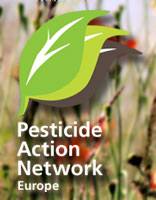12th November 2012
Brussels
10 years EFSA - 10 years of blind love for industry
EFSA has a track record of working closely with industry and with industry-linked people presenting themselves as independent scientist. EFSA easily embraces industry ideas while forgetting about their mission to protect people and the environment. We illustrate this 10 'lost' years by EFSA for improving human health and the environment with a few examples. However we see a glimmer of hope for the next 10 years in the recent EFSA-opinion on bees.
- EFSA organised a range of 'scientific' colloquiums' -generally organised with industry lobby club ILSI (International Life Science Institute)- crowded with industry people and crowded with industry-linked people, while civil society was excluded. Cases are the 2005-colloquium on genotoxic carcinogens (1), the 2006-colloquium on pesticide mixtures (2) and the 2011-joint EFSA/ILSI/CEFIC-workshop on TTC (3), an industry-tool to classify chemicals as 'safe' without testing. Many of the industry-linked people present have served in the EFSA-panels and illustrate the cosy relations.
- While politicians decided to oblige regulators such as EFSA to take into account independent scientific work published in scientific journals, EFSA managed to write a Guideline (4) effectively excluding independent science by using the so-called "Klimisch-ranking". H.J. Klimisch is an employee of BASF claiming that industry-sponsored studies should be preferred over studies done in independent laboratories. EFSA themselves (CEF-panel, food contacts) (5) showed very clearly their bias on independent literature dismissing all 700 independent studies on the chemical Bisphenol A while continuing to base their conclusions on 4 industry-sponsored studies.
- One of the clearest cases of conflict of interest was the work of EFSA on TTC (Threshold of Toxicological Concern). Industry consultant Susan Barlow volunteered to chair the working group and invited her network of industry people to join her. 10 out of 13 members of the TTC-wg. were people promoting the use of TTC in the past -generally together with ILSI- and still were supposed to perform an independent assessment. 8 out of 13 had formal relations with industry group ILSI (6). Note the clear evidence for scientific misconduct of Ms. Barlow when she worked for the cigarette industry (7) which had no repercussions for her membership of EFSA-panels.
- It is not only TTC which is embraced by EFSA but many industry-proposals and loopholes were adopted with help of the industry-linked in the EFSA-panels. Harmful effects demonstrated in animal studies many times were dismissed and considered "irrelevant' for humans, controls in animal studies were not used and substituted by statistical methods allowing harmful effects, toxic pesticide breakdown products were classified as 'non-relevant' (8), and wild plants and animals allowed to be killed by pesticides if they would return after one full year (called "recovery")
- So everything is wrong in EFSA? No, not everything, a good inspiration for the next 10 year EFSA is the opinion on bees (9) made by the EFSA PPR-panel: a thorough review of the scientific literature, independent though non-GLP laboratory studies taken into account and conclusions in opposition with the work of the nebulous industry-funded ICPBR (International Committee on Plant-Bee Relationship) who established the rules for the honeybee toxicity assessment of their own chemicals.
— ENDS —
Further information
For further information please contact:
Hans Muilerman, Tel: +316 55807255 Info, hans@pan-europe.info
NOTES:
References and detailed information
(1) - EFSA/WHO INTERNATIONAL CONFERENCE WITH SUPPORT OF ILSI EUROPE ON RISK ASSESSMENT OF COMPOUNDS THAT ARE BOTH GENOTOXIC AND CARCINOGENIC, Brussels, 2005. This 2005-genotoxicity meeting –organised with ILSI- was an ’invited-only’meeting (no civil society involved), crowded with industry-people from Nestle, Unilever, Coca-Coal, Procter & Gamble, Danone, PepsiCo, ILSI and industry-linked persons such as Barlow, Galli, Larsen, Schlatter, the latter group would show up in EFSA-panels for the years to come. The aim of the meeting was finding a „safe” level for genotoxic carcinogens. This initiative served to undermine EU policy to prevent any exposure to genotoxic carcinogens at all.
(2) - EFSA SCIENTIFIC COLLOQUIUM, CUMULATIVE RISK ASSESSMENT OF PESTICIDES TO HUMAN HEALTH: THE WAY FORWARD, Parma, 2006. Another important civil society topic of pesticide mixtures is dealt with in a meeting again crowded with industry-people from BASF, Bayer, Syngenta, ECPA, ILSI and the industry-linked persons such as Barlow, Boobis, Galli, Larsen, Moretto and no civil society people invited.
(3) - Workshop on the Threshold of Toxicological Concern: Scientific challenges and approaches, Brussels, 2011. Another EFSA meeting organised with ILSI (and even CEFIC) took place in 2011 on the controversial industry-proposal for TTC (Threshold of Toxicological Concern), a tool to classify chemicals as ’safe” without testing, even genotoxic carcinogens. Again exclusion of civil society and industry and industry-linked people (Barlow, Renwick, Gundert-Remy) dominating the meeting.
(4) - Submission of scientific peer-reviewed open literature for the approval of pesticide active substances under Regulation (EC) No 1107/2009, EFSA Journal 2011;9(2):2092. Main element is "Klimisch-ranking", stating that industry-GLP studies are more reliable than peer-reviewed open literature.
(5) - Scientific Opinion on Bisphenol A: evaluation of a study investigating its neurodevelopmental toxicity, review of recent scientific literature on its toxicity and advice on the Danish risk assessment of Bisphenol A, EFSA Journal 2010; 8(9):1829
(6) - A toxic mixture, Industry bias found in EFSA working group on risk assessment of toxic chemicals, PAN E report on TTC. A complete network of industry-linked people (Barlow, Boobis, Schlatter, Larsen, Bridges, Galli, Gundert-Remy, etc.) managed to infiltrate EFSA and to promote TTC .
(7) - Changing Conclusions on Secondhand Smoke in a Sudden Infant Death Syndrome Review Funded by the Tobacco Industry, Elisa K. Tong, MD, Lucinda England, MD and Stanton A. Glantz, PhD, PEDIATRICS Vol. 115 No. 3 March 2005
(8) - Scientific Opinion on Evaluation of the Toxicological Relevance of Pesticide Metabolites for Dietary Risk Assessment, EFSA Journal 2012;10(07):2799
(9) - Scientific Opinion on the science behind the development of a risk assessment of Plant Protection Products on bees (Apis mellifera, Bombus spp. and solitary bees), EFSA Journal 2012;10(5):2668
< Back


